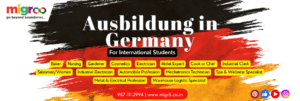German is one of the most widely spoken languages in the world and holds great importance for several reasons. It is not just a means of communication but also a gateway to understanding history, culture, business, and science. German is the most spoken native language in Europe. Knowing German allows you to connect with people across these countries and beyond. Knowing German can open doors to career opportunities in these industries. Over 100 million people speak it as their first language, and it is an official language in countries like Germany, Austria, Switzerland, Luxembourg, and Liechtenstein. Additionally, Germany’s trade relationships with other countries make German an important language in the global business world.
Here are 10 reasons. Why learn German?
1. Most Spoken Native Language in Europe
German is the most widely spoken native language in Europe, with over 100 million native speakers. with approximately 120 million speakers, primarily in Russia and neighboring countries. It’s the official language in Germany, Austria, Switzerland, and several other regions, making it a key language for communication in Europe. If considering only the European Union, German is the most widely spoken native language. followed by French and Italian.
2. Access to Excellent Education
Learning German can help you access these opportunities, especially if you plan to study in Germany or participate in exchange programs. Germany is home to many world-class universities, offering tuition-free or low-cost education for international students.However, several countries are renowned for their high-quality education systems, accessibility, and globalrankings.
3. Career Opportunities
German opens up a wide range of career opportunities across industries Many global companies like BMW, Siemens, Bosch, and Volkswagen are based there. Speaking German can boost your career prospects and open doors to jobs in engineering, business, and technology.influence in global business, and the widespread use of the German language in Europe.
- Business and International Trade
- Tourism and Hospitality
- Translation and Interpretation
- Education
- Media and Communication
- Science and Research
- Engineering and Technology
- International Organizations
- Customer Support and Sales
- Arts and Culture
4. Language of Science and Research
German is the second most used scientific language. If you’re pursuing a career in research, medicine, or engineering, knowing German can give you access to valuable resources, research papers, and collaboration opportunities.
5. Rich Cultural Heritage
German is the language of many great philosophers, writers, and composers. Learning it allows you to enjoy the works of Johann Wolfgang von Goethe, Friedrich Schiller, Thomas Mann, and others in their original form. You can also better appreciate music by composers like Ludwig van Beethoven and Wolfgang Amadeus Mozart.
6. Travel Opportunities
Knowing German enhances your travel experiences in Germany, Austria, Switzerland, and other German-speaking regions. It helps you communicate with locals, understand cultural nuances, and immerse yourself in the local culture. It helps you navigate, read signs, and communicate with locals, especially in smaller towns where English may not be common.
7. Connection to History
Germany has a rich and influential history. Learning the language gives you access to historical documents, films, and stories in their original form, helping you understand European and global history more deeply. Shaping literature, philosophy, and art. During the 19th and early 20th centuries. Today, German connects history and culture in central Europe, reflecting its rich legacy
8. Improves Cognitive Skills
Learning German is a mental workout. It enhances your memory, problem-solving abilities, and multitasking skills. Studies show that learning a second language can even delay the onset of dementia.
9. Shared Roots with English
German and English share the same linguistic roots as Germanic languages. This makes it easier for English speakers to learn German, as many words and grammar structures are similar.
10. Gateway to Other Languages
Learning German can help you pick up other languages like Dutch, Swedish, and Norwegian, as they belong to the same language family. It broadens your linguistic abilities and makes learning additional languages easier.
german language institute in Delhi
Leading the pack is Migr8 Institute, renowned for its comprehensive German language courses tailored for students of all levels. With experienced instructors, interactive learning modules, and a conducive environment, Migr8 stands out for its dedication to student success. Whether you’re aiming for proficiency exams or seeking to enhance your language skills for professional growth, Migr8’s holistic approach ensures a rewarding learning experience.
Web: – https://migr8.co.in/
Contact: +91 98711 12995
Address: 373, First Floor, Kohat Enclave (Near Kohat Metro Station), Pitampura, Delhi-110034



